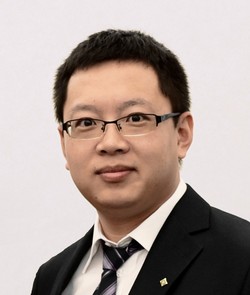Events
Dec 03, 2021
Seminar (2021-12-03)
School of Biomedical Sciences is pleased to invite you to join the following seminar:
Date: Friday, 3 December 2021
Time: 10:00 am – 11:30 am
Venue: Cheung Kung Hai Lecture Theatre 2, G/F, William M.W. Mong Block, 21 Sassoon Road, Pokfulam, Hong Kong
Speaker: Dr. Shiming Zhang, Assistant Professor, Department of Electrical and Electronic Engineering, Biomedical Engineering Program, HKU
Title: “Organic bioelectronics, an emerging technology for biomedical innovation”
Biography

Dr. Shiming Zhang is an Assistant Professor in the Department of Electrical and Electronic Engineering and a core faculty member of the Biomedical Engineering Program at HKU. Before joining HKU, he spent three years at UCLA, as a postdoctoral scholar, and obtained his Ph.D. (with honor) from Ecole Polytechnique, University of Montreal, Canada, and B.S./M.S. (with honor) from Jilin University, China. At HKU, he founded the wearable, iontronic and soft electronics (WISE) research group as PI. Dr. Zhang is known for his pioneer research on organic bioelectronics and soft iontronics. He is interested in the processing and patterning of conducting polymers, iontronic hydrogels, stretchable electrodes, and their integrations and prototyping for diverse healthcare applications. Leveraging his transdisciplinary background in electrical engineering, organic electronics, and biomedical devices, he developed the world’s first fully-integrated stretchable organic electrochemical transistors (OECTs) and demonstrated an early prototype of using stretchable OECTs for wearable healthcare applications. He has published more than 50 papers, including first (corresponding) authored papers on Nature, Matter, Advanced Materials, Lab on Chip, IEEE Electron Device Letters, and Applied Physics Letters. In addition, he has contributed to 1 book chapter and applied for 5 US patents. Dr. Zhang is currently serving as principal editor of MRS Advances, associate editor of Frontiers in Medical Technology (Diagnostic and Therapeutic Devices section), and a symposium organizer of MRS Fall 2021 (soft materials and wearable section). He is a featured scholar by the Global Medical Wearable Forum 2020 (San Jose) and is recognized as a top reviewer by Advanced Functional Materials (2020). He was named “Vanier Canada Scholar” by the Government of Canada, the highest honor for graduate students in Canadian Universities. He was also a recipient of the Chinese Government Award for Outstanding self-financed Student Abroad.
Abstract
The conflict between increased population ageing and limited medical resources nowadays have underlined an urgent demand for advanced biomedical solutions to achieve the goal of digital health and personalized medicine. However, current biomedical devices suffer from a low signal readout at the body-device interface, which is due to the poor communication between biological systems (which conduct ions) and electronic devices (which conduct electrons). Organic bioelectronics is an emerging research field that uses organic electronic materials at the interface between biology and electronics. The ability of organics to conduct ions in addition to electrons lowers the interface impedance and opens up a new communication channel between medical devices and biology. Besides, the biocompatible and soft nature of organics permits a more favorable environment for cells and better mechanical compatibility with tissues.
In this seminar, I will present our work in developing emerging organic bioelectronics technologies for better body-device interfaces, which has not been possible before. First, I detail our fundamentally novel contributions in developing soft organic bioelectronics. I show how soft conducting polymers and hydrogels enable the demonstration of skin-like and neuron-like biomimicking devices. Second, I describe how to use soft organic bioelectronics as a novel “iontronic tool” to address the unmet challenges of fundamental biomedical research. Third, I demonstrate how organic bioelectronics can enrich the toolbox of current biomedical technologies to promote transferable biomedical innovations on smart wearables, medical imaging, brain-inspired computing, and human-machine interfaces.
ALL ARE WELCOME
Should you have any enquiries, please feel free to contact Miss River Wong at 3917 9216.

